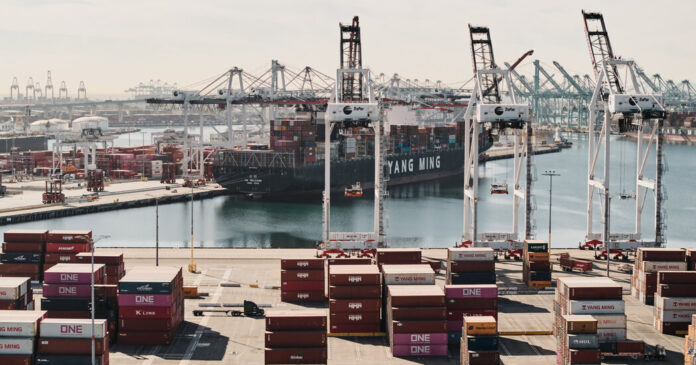Former President Donald J. Trump blames the global trading system for a long list of ills for the American economy, including lost jobs, closed foreign markets and an overvalued dollar.
The antidote, Trump said, is simple: tariffs. Trump, the Republican presidential candidate, has repeatedly said he would raise tariffs if elected. China, a geopolitical and economic rival, would face additional tariffs of 50 to 60 percent on its exports to the United States. Trump has also floated the idea of a 10 to 20 percent surcharge on exports from the rest of the world.
While general tariffs would be lower than the percentage proposed for Chinese exports, they have the potential to deal a far more devastating blow to world trade, many economists warn.
Such a surcharge would not distinguish between rivals and allies, essential and nonessential goods, faltering industries and superstars, or countries that abide by trade agreements and those that violate them. (Democrats have also embraced tariffs as a policy tool, but Vice President Kamala Harris, the Democratic presidential nominee, has criticized Trump's one-size-fits-all approach as inflationary.)
Here's what you need to know about the idea of a universal tariff on all imports.
What are the historical precedents?
Trump's blanket tariffs often draw comparisons to the destructive global trade war that the United States helped initiate in the 1930s with the Smoot-Hawley tariffs passed by Congress, which the Senate Historical Office called “one of the most disastrous pieces of legislation in the history of Congress.”
According to Douglas A. Irwin, economics professor at Dartmouth College, there is another relevant example.
In 1971, President Richard M. Nixon imposed a 10 percent surcharge on all taxable imports.
Nixon, a fervent internationalist, operated in a world economy very different from today's. Many of the defining features of the system created after World War II still applied to the financial world: foreign governments could instantly convert their dollars into gold at the U.S. Treasury, and many of the world's currencies were exchanged at fixed rates. Today, currencies are largely determined by market forces.
These inflexible rules led to the dollar being overvalued against the currencies of many of the US's major trading partners in the early 1970s. This in turn made American goods more expensive abroad than imports.
The United States had too many outflows and too few revenues, which meant that the United States was in danger of running out of reserves to pay off its foreign debt.
The 10 percent surcharge on imports introduced by the Nixon administration was designed to pressure other countries to devalue their currencies and boost American exports while making imports more expensive. If the unfair exchange rates were eliminated, the president declared in a televised address, “the import tax will also be eliminated.”
They did, and after four months the contract was revoked.
What is remarkable about the 1971 episode, says Irwin, is that “Nixon had a very specific purpose in enforcing this rule and set clear conditions for how and when the rule would be repealed.”
In contrast, Trump has never clearly stated “what the purpose of these tariffs should be and under what conditions they will be eliminated,” Irwin said. His policy lacks a concrete goal and a timetable.
This makes success less likely, he said.
Would a general tariff be a good negotiating tool?
Trump has stated that he would use the threat of high tariffs as a negotiating tactic to force his trading partners to make concessions.
“And, man, that's good for negotiations,” Trump said of tariffs in an interview with Bloomberg Businessweek. “They would do anything.”
But during Trump's time in office, some of the United States' largest trading partners responded to his tariffs with tariffs of their own, including the European Union, China, Canada, Mexico and India.
A similar vicious cycle of retaliation would most likely repeat itself.
If Trump imposes a 10 percent surcharge on all imports, “every country, including Japan, will retaliate to the same extent,” says Shigeto Nagai, head of the Japan economics department at the consulting firm Oxford Economics.
This could result in the worst possible outcome for the US and its allies, economists say: a combination of recession and higher inflation.
“Nobody is happy about a trade war,” said Kimberly Clausing, an economist at the Peterson Institute for International Economics who served in the Treasury Department under President Biden. “But nobody is happy about the Trump administration's bullying.”
What would be the economic consequences of a “tariff for all”?
The United States imported $427 billion worth of goods from China in 2023, Ms. Clausing said, while imports from the rest of the world were nearly $2.7 trillion. “So I would expect this to be a bigger shock, both to the U.S. economy and abroad,” she said.
The tariffs imposed by Trump on China in 2018 led to a realignment of trade, the International Monetary Fund found. China exported more to other countries, and other countries exported more to the United States.
“If you impose tariffs on everyone, this restructuring will stop and there will be a major price shock for the world,” said Ms Clausing.
Trump and his supporters argue that tariffs would increase domestic production, create good-paying jobs and reduce inflation. They would also bring in additional revenue, Trump says.
But most economists agree that the disadvantages outweigh the advantages. A round of reciprocal tariffs would ultimately hurt every country by restricting trade, disrupting global supply chains, slowing growth and driving up prices.
Kiuko Notoya contributed reporting.















